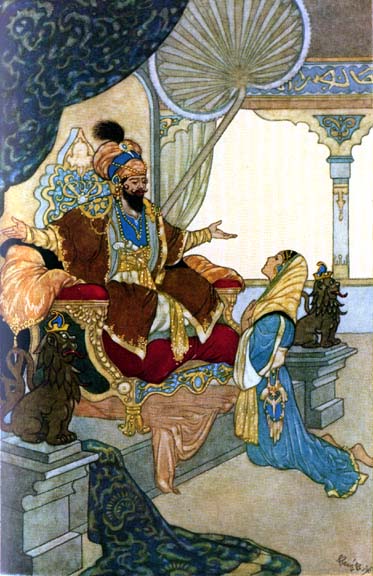“Glory be to Him who changes others and remains Himself unchanged!”
And hence, glory be to the aforementioned book, translated by Sir R.F Burton.
The book is written in archaic English, with a subtle merging of the poetic and the prose style of writing. The book is a translation of the famous Arabic classic, with the same name.
The book starts with the introductory prologue, which talks of how a noble king turns to a tyrant after being betrayed by his wife, and decides to cleanse the earth of the womankind, whom he takes to be the most treacherous and filthy creatures ever created by the praiseworthy Allah, and the plot continues into the minister’s daughter Scheherazade deciding to stop this murderous rage. Scheherazade extends the killing for a thousand and one nights, using her expertise of storytelling, and the book consists mainly of ‘The Tales of Scheherazade’.
The book is highly layered, and this creates the foreground for some really interesting discussion. On the first layer, the book seems to be talking of a patriarchal, religious (bigotry, almost) and sexist notion of the then-Islam-based-society, while, on dwelving deeper, the poetic verses reveal their true nature. Not only are they full of innuendos pointing towards a very physical (and material) world, but also talks of queer fascism, which is quite exciting for such a book. The preconceived notions about the book disappear when read with care and caution, and a very intriguing textual world opens itself to reveal lines of carefully coded passions and emotions. The book is also of a very labyrinthine concept (Like ‘Labyrinths’ by Jorge Luis Borges), with tales being sewn underneath a tale, which may be a master tale in itself.
The meta-protagonists of the novel are found in apparently homo-erotic positions many a times , or using language which only a couple would’ve been using, during that time.
What is saddening is that this facet of the book has remained hidden and underestimated for a long time. If queer fascism is so subjectively explored in the undertones of such an old masterpiece, why, just why do the Islamists cite religion as an anti-homosexuality weapon? We think.
Burton’s linguistic skills are an added impetus to the book, with the archaic being so infectious and enchanting that you may get transported to the world of the Arabian Nights, easily.
No rating would do justice to this masterpiece, and as we continue to question the reasons for the entire series not being called an ‘Epic’, we advise you to check out this book, if you haven’t already.
- Free Skills-Based Education for Two Trans Women in West Bengal Brings Them Closer to Becoming a Nurse - July 4, 2017
- LGBTQ Support Groups of IITs, IIMs, BITS and IISc Come Together To Raise Awareness on Queer Issues During Pride Month - June 10, 2017
- In a First in India, Panjab University Starts Building Separate Toilet for Transgender Students - May 25, 2017

